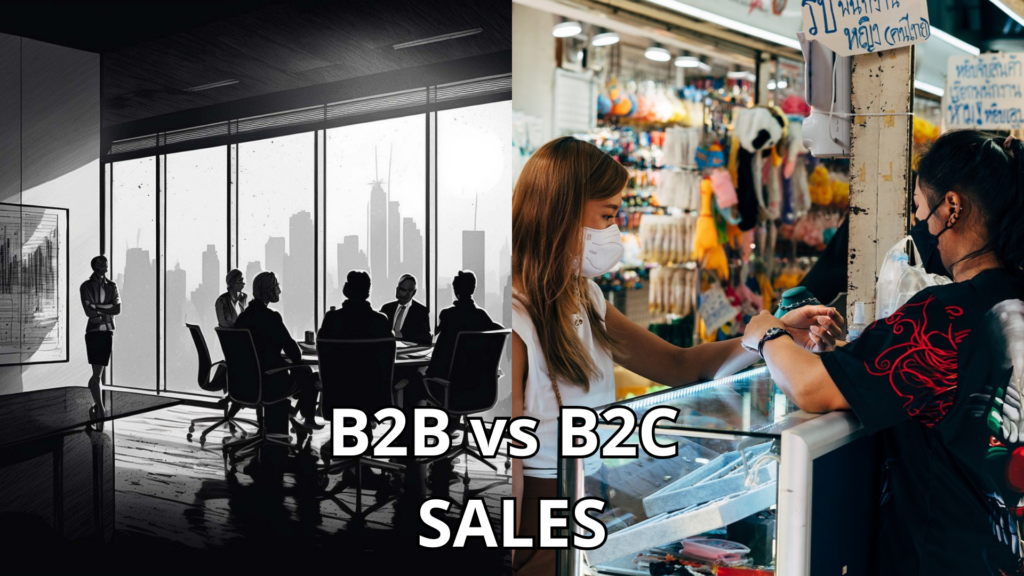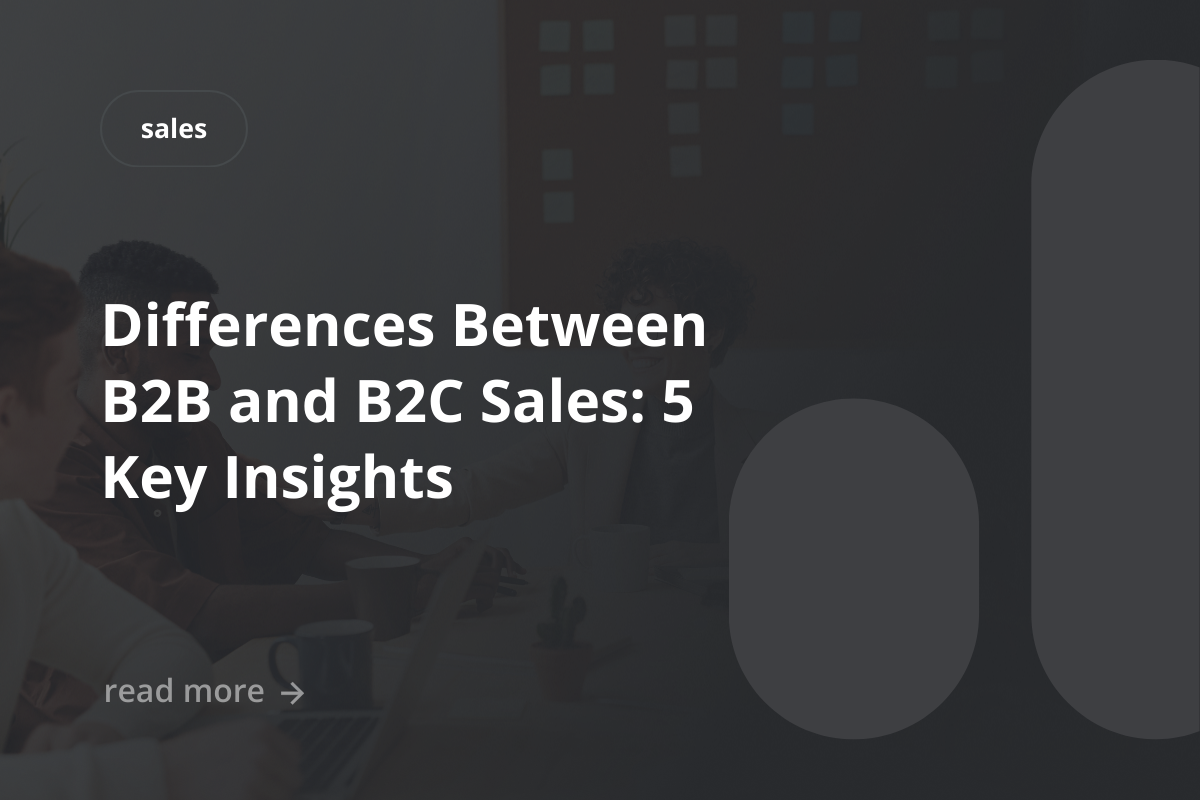Key Differences Between B2B and B2C Sales
Understanding the differences between B2B (business-to-business) and B2C (business-to-consumer) sales is crucial for any sales professional. These two types of sales operate under different principles and strategies, which can significantly impact how products and services are marketed and sold. Recognizing these differences can help businesses tailor their approaches to better meet the needs of their target audiences.
Target Audience: Who You’re Selling To
In B2B sales, the target audience consists of other businesses, which means the sales process often involves multiple stakeholders and decision-makers. This contrasts with B2C sales, where the focus is on individual consumers. Understanding the motivations and needs of these different audiences is essential for crafting effective sales strategies.
Sales Cycle: Long vs. Short Processes
The sales cycle in B2B sales is typically longer due to the complexity of the products and the need for thorough evaluations. In contrast, B2C sales typically have shorter sales cycles, as consumers can make quicker purchasing decisions. This difference in sales cycles requires distinct approaches to managing customer relationships and follow-ups.
Decision-Making in B2B Sales vs B2C Sales
Decision-making in B2B sales usually involves a group of people, which can lead to a more structured and formal process. On the other hand, B2C sales are often driven by individual preferences and emotions, leading to quicker decisions. Understanding these dynamics is key to effectively engaging with each type of customer.
Value Proposition: ROI vs. Emotional Appeal
In B2B sales, the value proposition frequently focuses on return on investment (ROI) and efficiency, as businesses seek to maximize their profits. Conversely, B2C sales tend to emphasize emotional appeal and personal benefits, aiming to connect with consumers on a more personal level. This distinction shapes how sales messages are crafted and delivered.
Relationship Management: Building Long-Term vs. Quick Connections
B2B sales prioritize building long-term relationships, as repeat business is critical for success. In contrast, B2C sales may focus on quick connections and one-time purchases. This difference influences how sales teams approach customer engagement and retention strategies.
The B2B Sales Process: How It Differs from B2C
The business-to-business sales process is quite different from business-to-consumer sales, primarily due to the nature of the customers involved. In B2B, the focus is on building relationships and understanding the needs of other businesses, while B2C often centers around individual consumer preferences.
This difference shapes how sales teams approach their strategies and interactions.
Understanding Stakeholder Involvement
In B2B sales, multiple stakeholders are usually involved in the decision-making process. This means that sales teams must engage with various individuals, each with their own interests and concerns. It’s essential to identify key decision-makers and influencers within the organization to tailor the sales approach effectively.
- Identify key players: Understand who the decision-makers are in the buying organization.
- Engage with influencers: Build relationships with those who can sway the decision.
- Address concerns: Be prepared to answer questions and address the specific needs of each stakeholder.
Customization in B2B Sales
Customization is a significant aspect of the B2B sales process. Unlike B2C, where products are often standardized, B2B sales frequently require tailored solutions to meet the unique needs of each business. This can involve creating personalized proposals, adjusting pricing structures, or even modifying products to fit specific requirements.
Customization in B2B sales not only helps in closing deals but also fosters long-term relationships with clients.
In summary, the B2B sales process is characterized by a focus on relationship-building, stakeholder involvement, and customization. Understanding these differences is essential for sales teams aiming to succeed in the B2B landscape.
B2B vs B2C Marketing: Aligning Strategies
Understanding the differences in marketing strategies between B2B (business-to-business) and B2C (business-to-consumer) is important for success in both fields. B2B marketing typically focuses on building long-term relationships, while B2C marketing tends to emphasize quick sales and emotional connections. This distinction shapes how companies approach their marketing efforts, from messaging to the channels they choose.

Messaging Styles: Differences Between B2B and B2C Communication
In B2B marketing, the messaging is typically more formal and data-driven. Businesses aim to provide detailed information that highlights the benefits and ROI of their products or services. In contrast, B2C marketing often uses emotional appeals and storytelling to connect with consumers on a personal level. Here are some key differences:
- Tone: B2B uses a professional tone, while B2C is more casual and relatable.
- Content: B2B focuses on case studies and white papers, whereas B2C uses ads and social media posts.
- Target audience: B2B targets decision-makers, while B2C targets individual consumers.
Channels and Tools for Effective Outreach
The channels used for B2B and B2C marketing also differ significantly. B2B marketers often rely on email campaigns, LinkedIn, and industry events to reach their audience. On the other hand, B2C marketers utilize social media platforms, influencer partnerships, and online ads to engage consumers. Here are some common channels:
- B2B: Email newsletters, webinars, and trade shows.
- B2C: Instagram, Facebook ads, and promotional events.
- Both: Content marketing and SEO strategies.
Understanding these differences in marketing strategies is essential for businesses to effectively reach their target audiences and achieve their goals.
Conclusion about Differences Between B2B and B2C Sales
In summary, understanding the differences between B2B and B2C sales is a key for anyone involved in selling. B2B sales regularly involve longer processes, more decision-makers, and a focus on building strong relationships. On the other hand, B2C sales tend to be quicker, with a greater emphasis on emotional appeal and individual customer experiences. By recognizing these key differences, businesses can tailor their strategies to better meet the needs of their target audiences, whether they are selling to other businesses or directly to consumers. This knowledge not only helps in improving sales techniques, but also in creating more effective marketing campaigns.
Frequently Asked Questions
What is the main difference between B2B and B2C sales?
B2B sales focus on selling to businesses, while B2C sales target individual consumers.
Why is the sales cycle longer in B2B sales?
In B2B sales, there are more steps and people involved in making decisions, which can take more time.
How do B2B and B2C sales approaches differ?
B2B sales often require building relationships and trust, while B2C sales can be more about quick purchases.
What type of value do B2B and B2C sales emphasize?
B2B sales usually focus on return on investment (ROI), while B2C sales often appeal to emotions and personal desires.
How important is relationship management in B2B sales?
Relationship management is very significant in B2B sales as it helps in building long-term partnerships.
What are some key marketing strategies for B2B and B2C?
Business-to-business marketing often uses professional channels and detailed content, whereas business-to-consumer marketing tends to use social media and emotional messaging.



